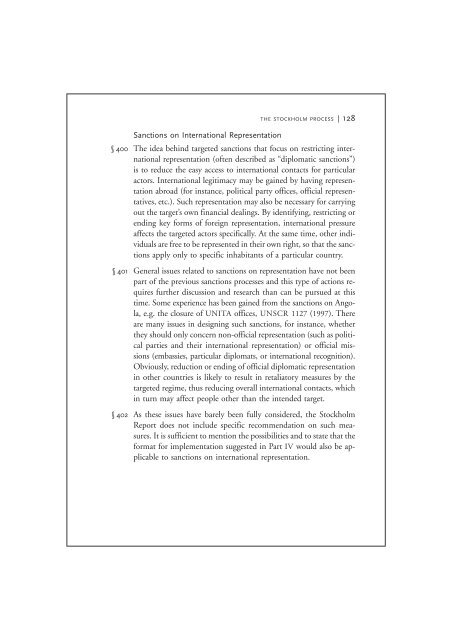Making Targeted Sanctions Effective - Small Arms Survey
Making Targeted Sanctions Effective - Small Arms Survey
Making Targeted Sanctions Effective - Small Arms Survey
You also want an ePaper? Increase the reach of your titles
YUMPU automatically turns print PDFs into web optimized ePapers that Google loves.
§ 400<br />
§ 401<br />
§ 402<br />
<strong>Sanctions</strong> on International Representation<br />
THE STOCKHOLM PROCESS | 128<br />
The idea behind targeted sanctions that focus on restricting international<br />
representation (often described as “diplomatic sanctions”)<br />
is to reduce the easy access to international contacts for particular<br />
actors. International legitimacy may be gained by having representation<br />
abroad (for instance, political party offices, official representatives,<br />
etc.). Such representation may also be necessary for carrying<br />
out the target’s own financial dealings. By identifying, restricting or<br />
ending key forms of foreign representation, international pressure<br />
affects the targeted actors specifically. At the same time, other individuals<br />
are free to be represented in their own right, so that the sanctions<br />
apply only to specific inhabitants of a particular country.<br />
General issues related to sanctions on representation have not been<br />
part of the previous sanctions processes and this type of actions requires<br />
further discussion and research than can be pursued at this<br />
time. Some experience has been gained from the sanctions on Angola,<br />
e.g. the closure of UNITA offices, UNSCR 1127 (1997). There<br />
are many issues in designing such sanctions, for instance, whether<br />
they should only concern non-official representation (such as political<br />
parties and their international representation) or official missions<br />
(embassies, particular diplomats, or international recognition).<br />
Obviously, reduction or ending of official diplomatic representation<br />
in other countries is likely to result in retaliatory measures by the<br />
targeted regime, thus reducing overall international contacts, which<br />
in turn may affect people other than the intended target.<br />
As these issues have barely been fully considered, the Stockholm<br />
Report does not include specific recommendation on such measures.<br />
It is sufficient to mention the possibilities and to state that the<br />
format for implementation suggested in Part IV would also be applicable<br />
to sanctions on international representation.
















